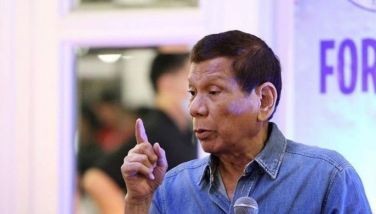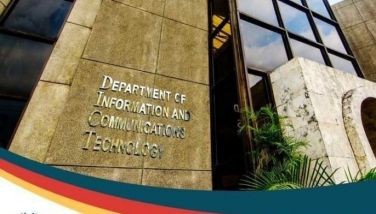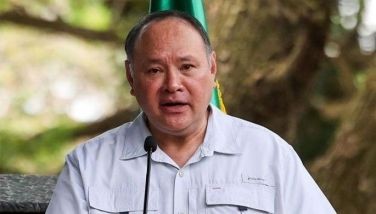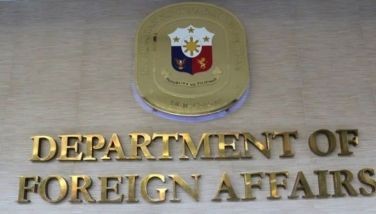Lawmakers oppose immunity for Marcoses
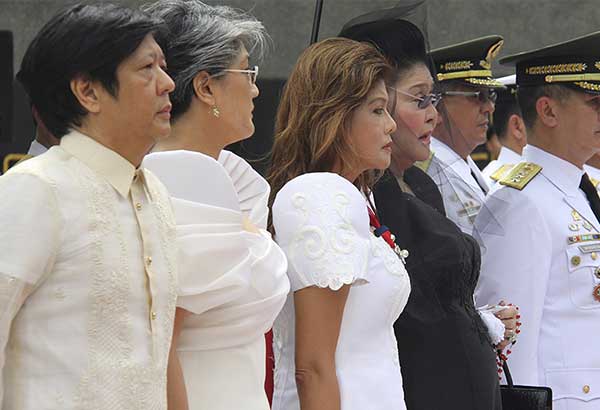
“It is well settled in Philippine jurisprudence that criminal liability is not subject to compromise. In Chavez vs Presidential Commission on Good Government (Dec. 9, 1998), the Supreme Court voided the challenged compromise agreement insofar as it granted the Marcoses immunity from criminal prosecution,” Albay Rep. Edcel Lagman said. AP/OACPA HPA, File
MANILA, Philippines — Opposition congressmen are against President Duterte’s proposal for Congress to grant the Marcoses immunity from criminal prosecution in exchange for returning part of their alleged ill-gotten wealth.
“It is well settled in Philippine jurisprudence that criminal liability is not subject to compromise. In Chavez vs Presidential Commission on Good Government (Dec. 9, 1998), the Supreme Court voided the challenged compromise agreement insofar as it granted the Marcoses immunity from criminal prosecution,” Albay Rep. Edcel Lagman said.
“A culprit who returns what he has stolen is not liberated from criminal prosecution. It is a mockery of justice and an insult to the aggrieved sovereign people to exempt the Marcoses from criminal culpability in exchange for a few pieces of stolen gold bars or even for their entire ill-gotten hoard,” he said.
“A criminal must pay for his crime despite his having belatedly returned the object of his transgression,” he said.
He pointed out that the grant of immunity from criminal prosecution is the “hidden agenda” behind Duterte’s appeal for Congress to pass a law authorizing him to negotiate with the Marcoses for the surrender of their alleged ill-gotten wealth.
Lagman’s opposition colleague Tom Villarin of Akbayan said the Marcoses are facing 248 cases in the Philippines and abroad in connection with their wealth.
He said the Supreme Court ruled in 2003 that all assets of the Marcos family that were beyond their accumulated legal earnings of a little over $300,000 were ill-gotten.
He said the Marcoses were believed to have amassed an estimated P10 billion in wealth.
“Enacting a law giving immunity to the Marcoses would give a wrong signal that committing a crime will pay off in the end as justice is negotiable by the powers that be,” he added.
“The premise laid by President Duterte that he ‘accepts’ the explanation by the Marcoses that the wealth was not ill-gotten as they just held it in trust for us is a gross distortion of law and history,” Villarin stressed.
‘Crazy idea’
Another opposition congressman, Teodoro Baguilat Jr. of Ifugao, said the proposed grant of immunity “is a crazy idea that is not in any of Philippine legal principles.”
“If the President’s idea pushes through, let’s abandon all concepts of law and justice. I can steal anything from anyone, make money out of it for a while, then offer to return and get amnesty for it. Heck, I may even be buried as a hero,” he said.
“But this is more than just the money. It’s about justice and accountability for the crimes against the people during martial law – the killings, the torture, the suppression of freedoms and the degradation of our democratic institutions,” he said.
“Is the President proposing that with one legislative fiat, everything will be forgotten?” Baguilat asked.
For their part, Duterte’s leftist congressmen-allies joined the opposition in going against the proposed grant of immunity for the Marcoses.
“We will oppose this move every step of the way,” Bayan Muna Rep. Carlos Zarate said.
“Justice must be served and the Marcoses should be punished for what they did to our country and people during martial law. This is not just an issue of returning their ill-gotten wealth back to the Filipino people but of obtaining justice as well,” he said.
Another administration ally, Harry Roque of party-list Kabayan, said a law granting immunity to the Marcos family alone would be unconstitutional, as it would violate the Charter’s equal protection provision.
“We cannot legislate just to accommodate the Marcoses. We can probably legislate, put it in very generic language and made applicable to all who want to confess and who want to return stolen assets of the government, and give them a period. So this will be a form of amnesty,” he said.
“I think the President is toying with the idea na, just to put an end to this, let’s come up with a law that will afford them (Marcoses) immunity in exchange for a compromise,” he theorized.
“Although that law is possible, it is still susceptible to constitutional challenge because it is not one of the powers expressly enumerated to belong either to the executive or to Congress,” the former UP law professor explained.
“All laws must not be inimical to public policy and good morals,” he stressed.
“So some could question an immunity on the basis of a settlement as contrary to good policy and good morals,” he added.
Rep. Alfredo Garbin Jr. of party-list Ako Bicol, who is a lawyer, said, “Congress cannot pass a law that can only be repealed later.”
Why not?
But House Minority Leader Danilo Suarez and Rep. Lito Atienza of party-list Buhay said there is no harm in trying, especially now that government needs help in pump priming the economy with President Duterte’s build, build, build program.
“There is denial or admission (from the Marcoses). And in fairness to her (Imelda), sinabi niya sa akin na: hindi namin ninakaw iyan (she told me: ‘We didn’t steal it),”’ the former Manila mayor said, referring to the 7,000 tons of gold the family has reportedly offered to turn over to government.
Atienza related the former first lady personally confided such information to him when he was still mayor. Her daughter, now Ilocos Norte Gov. Imee Marcos, who was present, “told me not to believe her mother.”
“I was having doubts at first, but when I saw her on primetime TV showing a roomful of gold bar certificates, then I believe her. But you (media) should ask her. Remember, 7,000 tons is more than those at Fort Knox which is just 4,500 tons (of gold).”
Meanwhile, Armed Forces of the Philippines (AFP) spokesman Col. Edgard Arevalo said the Marcoses have yet to formally coordinate with the military on their plan to celebrate the birthday of the late strongman at the Libingan ng mga Bayani.
“I am not aware about it at this time, but of course we expect that we will be officially informed because while they (Marcoses) have every right to be at the LNMB, the place is maintained and secured by the military,” Arevalo said.
The Libingan is under the Army’s jurisdiction.
“It’s their right to be at LNMB but this scheduled event is likely to trigger protest actions from anti-Marcos protesters and we don’t want that to happen right inside the place we consider as hallowed ground,” an Army officer who declined to be named said.
From his burial place in Batac, Ilocos Norte, Marcos remains were discreetly flown to Manila and buried at the Libingan in November last year, catching protesters off guard.
Citing a source close to former first lady, The STAR reported that the Marcoses were planning to celebrate the centennial birth anniversary of their late patriarch at the Libingan.
“It’s a family affair, plus friends and guests,” the source told The STAR.
Another source said among those invited are ranking government officials and foreign diplomats.
It’s not clear if President Duterte, a Marcos ally who allowed the hero’s burial, is among those invited.
Marcos, born on Sept. 11, 1917 in Sarrat, Ilocos Norte died in exile in Hawaii in 1989. His remains were brought back to the country in 1991.
SC challenge
For Senate President Aquilino Pimentel III, any law aimed at settling the cases against the Marcoses and recovering their ill-gotten wealth would likely be questioned by the Supreme Court.
He said the present setup with the PCGG is correct but the PCGG can deal only with individual cases against the Marcoses.
He said there is already a system in the PCGG or in the justice system for settlements or plea bargains but they are on a per case basis.
“Let’s say a law which authorizes the president of the republic to enter into a compromise agreement with the Marcos family under the following terms and then there’s an ending there, like that all pending cases shall be moved to be withdrawn by the executive branch, something like that,” Pimentel said.
“Even if we pass a law, very specific for the Marcoses, it can still be questioned under that theory,” Pimentel said.
Senate Minority Leader Franklin Drilon said the PCGG, under the law and existing jurisprudence, is authorized to enter into compromise agreements.
“Under the law, the PCGG is mandated to assist the President in the recovery of ill-gotten wealth. In pursuit of its mandate, the PCGG can legally enter into compromise agreements,” Drilon said.
The compromise, he said, should be limited only to civil cases as in the forfeiture of ill-gotten wealth.
He clarified that while there is clear jurisprudence establishing PCGG’s authority to enter into such agreements, the validity of the stipulations in such compromise agreements must pass judicial scrutiny.
“Any compromise agreement shall be valid and binding only upon court approval. No agreement can be made contrary to law or the Constitution,” he said.
Drilon also clarified that he is not supporting any compromise agreement but is merely explaining PCGG’s authority.
The former justice secretary listed at least three cases where the court upheld the power of the PCGG to enter into compromise agreements.
In the 2005 case of Republic and Jose O. Campos Jr. v. Sandiganbayan, the Court ruled that the compromise agreement between PCGG and alleged Marcos dummy Potenciano Ilusorio “must be accorded utmost respect.”
The agreement was approved by then president Fidel Ramos and subsequently approved by the Sandiganbayan.
In Benedicto v. Board of Administrators of Television Stations RPN, BBC and IBC, Drilon said the Court ruled that the power of the PCGG to enter into compromise agreements was “indisputable.”
In Chavez v. PCGG, the Court also said that the PCGG may enter into compromise agreements involving cases of ill-gotten wealth, “pursuant to EO 14’s objective of securing a just and expeditious recovery of such wealth.” – Paolo Romero, Delon Porcalla, Jaime Laude
- Latest
- Trending
















